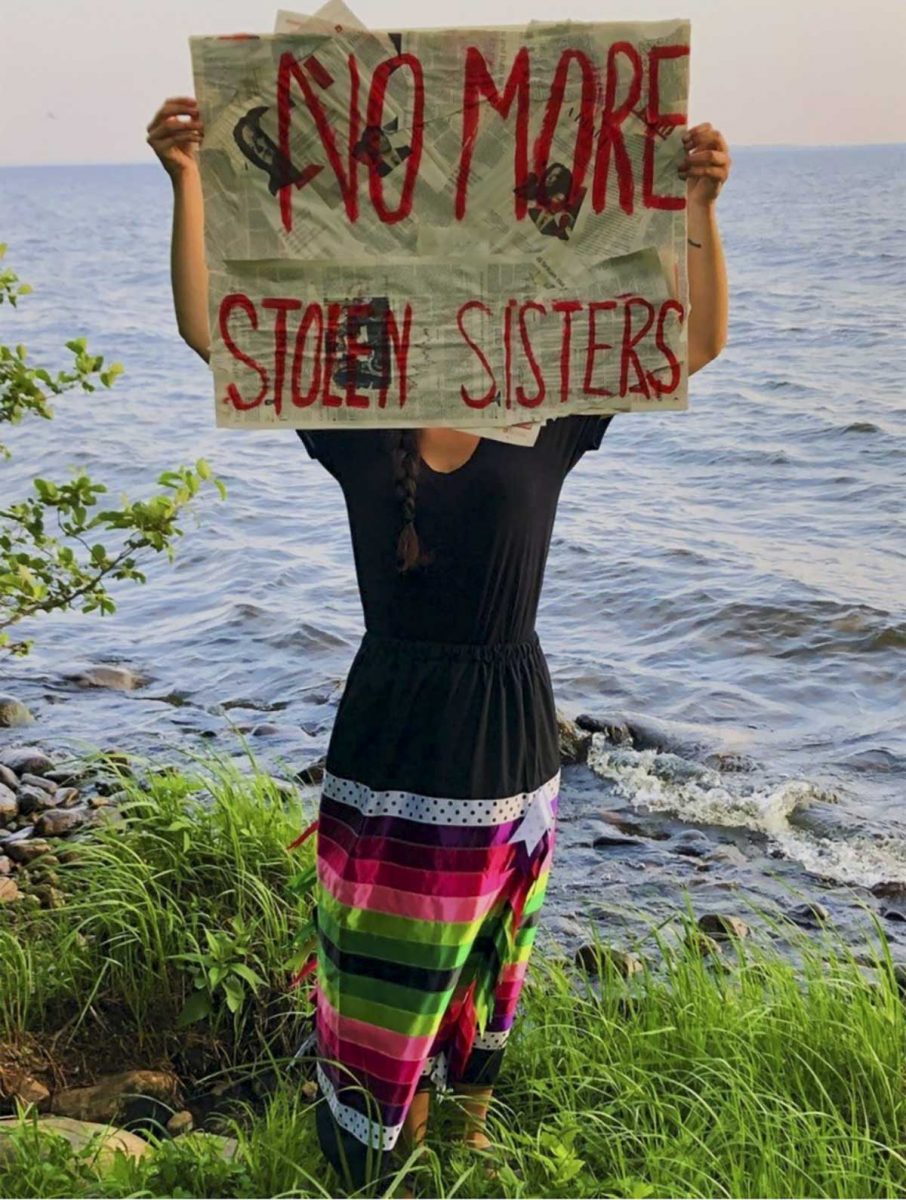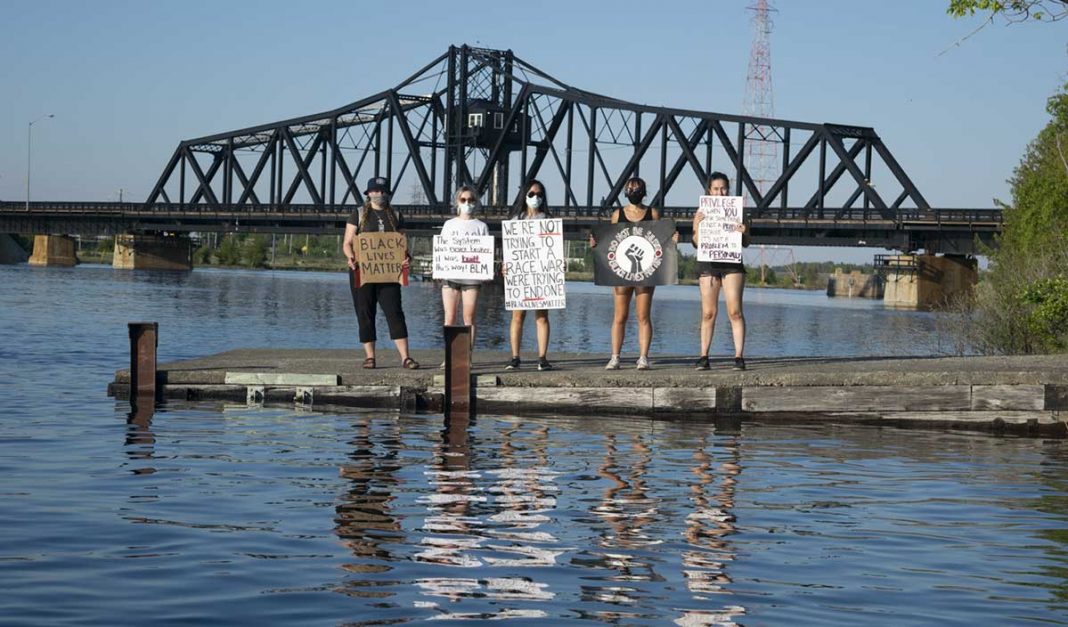by Hadeel Alhadi
MANITOULIN—In the past few months, the world has witnessed a rise in youth activism. Thousands of young activists are working relentlessly for causes like racial and gender equality, Indigenous rights, climate change, 2SLGBTQIA rights and economic justice. Manitoulin youth are claiming their place in the battle for justice; from social media posts to peacefully protesting on the streets, they are using their voices for good.
Ryann Hudson, ndishinkaas Webjiwong ndoonjibaa (an Anishinaabe kwe from Little Current), said regarding the surge of new youthful voices, “I believe young people are speaking up now because they are just beginning to learn the real history of Canada.” Ms. Hudson is studying towards her bachelor of arts in social welfare and development as well as her bachelor of education.
“I think young people see the future and realize that one day it will be theirs. The environment is a good example of this.” Jocelyn Kuntsi, a Grade 10 student from Manitowaning, stated. Jocelyn added that her mother and sister have inspired her to become more politically active. She also participated in the Legislative Page Program which “empowered her to have a stronger voice,” as she described it.
“Politics is a difficult topic. I tend to think of issues of equality and injustice as human rights issues, rather than something for politicians to debate about.” Alicia Williamson, an Island youth who resides in Little Current and is a member of Wiikwemkoong Unceded Territory, stated.
Ms. Williamson is an Indigenous social work student at Laurentian University. In March 2020, she co-organized a penny table fundraiser to support the protests held in solidarity with a blockade of the Coastal GasLink pipeline in northern British Columbia by members of the Wet’suwet’en Nation. “I felt like no one was paying attention to what was happening. The RCMP were arresting land defenders on their own territory, forcing them off their ancestral lands for a pipeline.” Ms. Williamson was pleasantly surprised by the amount of support the fundraiser got, and that they were able to donate 100 percent of the funds to the Unist’ot’en Legal Fund with a small contribution to Shaylyn Lands—an Indigenous youth who was water-walking in solidarity with Wet’suwet’en.
Ms. Williamson, one of the co-organizers of Manitoulin’s Black Lives Matter (BLM) march, stated that even though they received some backlash on social media, the community support was amazing. “I was shocked by how many community members mobilized in the comment section to spread information and support the BLM movement,” Ms. Williamson said, adding that “sometimes it feels like no one is paying attention, but recently this has changed in our community.”
In regards to community support Jocelyn said, “usually my friends and peers are supportive. They also see change as our future.” Jocelyn says that she found SHARE/Go Green, a club at MSS, particularly supportive and willing to learn and educate. She also acknowledged that it is often difficult to get enough people interested in these issues in a small community, which is why social media is such a powerful tool. Jocelyn stated that with the use of social media comes responsibility. “If I am going to be talking about an issue and promoting some sort of change I want to be completely informed.”

Wiikwemkoong band member Alicia Williamson, who lives in Little Current, says she prefers to treat issues as human rights-based rather than politically motivated. 
Ryann Hudson, who is studying toward bachelor degrees in both education and social welfare and development, says youth are speaking out more as they learn the real history of Canada.
Jill Dickson, a co-organizer of Manitoulin’s BLM march and an active advocate on social media, explained that the use of social media is a double-edged sword. “Social media is a blessing to help share your stories, events, information, etc., however activism shouldn’t stop after you post a picture or use a hashtag.” Ms. Dickson continued to explain that you can’t end injustices with the tap of a button, “it is an ongoing fight.”
Ms. Dickson uses her platform to share information, resources and to inspire others. “I have had a couple people say they always keep up with my Instagram stories and appreciate what I share; I’ve also had others mock me for my posts.” It is no surprise that there are conflicting opinions regarding the benefits of social media but one cannot deny that it is the most accessible platform, especially during the current pandemic.
Ms. Hudson, who is also an active advocate on social media, explained another risk that accompanies the use of such platforms saying, “social media is set up through algorithms that produce like-minded content onto an individual’s feed. These algorithms often create tunnel vision which makes seeing the other point of view difficult.”
The young activists on Manitoulin remind everyone that even though it seems like we exist in isolation from these issues, Canada still has work to do. There are many pressing issues that need to be addressed including missing and murdered Indigenous women, girls and two-spirit people, the inherent racism in Canada’s justice system, education, healthcare, housing, policing and access to drinking water in First Nation communities.
Even though it might be slow, positive change is happening all over the world.
“Strength in numbers!” Jill Dickson said, encouraging others to use their voices and keep up the momentum. “They will never have the comfort of our silence again.”



